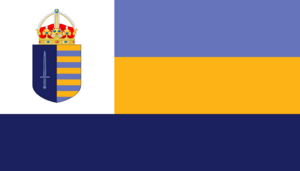Grajnidar
Kingdom of Grajnidar Mnijanca Kgrajnitarsko'kmaka (New Grajni) | |
|---|---|
Motto: Pte litun fjense'kmaka ("For the greater good") | |
| Capital and largest city | Minvras |
| Official languages | New Grajni |
| Religion | Varheism |
| Demonym(s) | Grajnidaren (noun) Grajnidaren (adjective) |
| Government | Constitutional Monarchy |
| Ukwar II. | |
• Premier | Jondar Nakastee (Grajnidaren Democratic Party) |
| Population | |
• Estimate | 79,932,213 |
| GDP (nominal) | estimate |
• Total | $1,784,646,519,651 |
• Per capita | $22,327 |
| Currency | Grajnidaren Crown |
| Driving side | right |
Grajnidar, officially the Kingdom of Grajnidar, is a medium-sized Constitutional Monarchy located in southern Sarpedon next to its northern and only neighbour Aciria. It is home to more than 79 million citizens, of which a majority is ethnically Grajni. Kharitanians and Vsikites are considered a minority in the country. Grajnidarens are part of the Ganastic ethno-linguistic group, which remains one of the smallest in the whole world. The capital and largest city is Minvras with over 8 million residents. The Kingdom of Grajnidar remains a developed country with an advanced, high-income economy.
[[category:Countries]]
Name
Grajnidar's name means the "Land of the Grajnis" in New Grajni and other Southern Ganatic languages. The word Grajni is used in a slightly simplified form, the original one being Kgrajni, which is nowadays officially used only in some regions of Grajnidar. The word Grajni itself derivates from the proto-ganatic word Kgran, meaning 'the sea human'.
The country has been traditionally divided into three lands, namely Grajni (Kgrajni) in the south, Kharitania (Khnartarin) in the west, and Vsikit (Vssiktit) in the north.
History
The Great Grajnidaren Raids
The first ever mentions of the Ganatic tribes come from the 6th century, when they entered the continent of Sarpedon as raiders. It is not known where they came from
Age Of Settlement
First Grajni Empire
Acirian Nationalists War
Second Grajni Empire
Age Of Chaos
Age Of Reforms
The Kingdom of Grajnidar
Most of the early history of Grajnidar is totally unknown as the first ever mentions of the Ganatic tribes come from the 6th century, when they entered the continent of Sarpedon as raiders. After decades of chaos and killing they decided to stay in the southern part of the continent, supposedly because of the rich natural resources and overall good conditions to live, where they split into 3 main groups of tribes. The very first form of state emerged from the Grajni group, which was supposedly the most advanced one of them and basically remained dominant throughout the history, in the middle 8th century. What is officially called the First Grajni Empire was then a dominant force in the south-western Sarpedon for a long time, with all the Kharitan tribes later joining the Empire, allowing it to expand to the western coast without a single battle fought. But in the north the situation for the Empire wasn't so bright, with the Vsikitian tribes being extremely hostile and forming a nation of their own for the sole purpose of defendimg their sovereignty from the Empire. This rivalry between Grajnis with Kharitans and Vsikitians remains till this very day, with the Vsikitians still having a fairly strong regional identity and being somewhat competitive to the rest of the modern day country. (still wip, more to come)
Goverment

Grajnidar is a fairly authoritarian parliamentary constitutional monarchy. On paper the nation is lead by the Premier Jondar Nakastee from the Grajnidaren Democratic Party (GDP), who serves as the only head of goverment. With the king Ukwar II. from the Muulikartheda dynasty being nothing more than the head of state. But in reality the King has much more power over the goverment. He can decide what laws and changes will pass, and which not. He has control over the whole Grajnidaren diplomacy and often gives 'little tips' to the goverment, which, althought do not officially have to be, are always fully implemented. The Grajnidaren constitution has seen quite a few changes in the past years, slowly giving the King more and more power. And while these changes and the goal of them is quite obvious, no one was ever successful in the efforts of stopping it from happening.
The National Parliament is responsible for drafting new laws and handling the state budget, but alone doesn't really have any power, as before a law passes it needs to be checked by the Senate and then the King who has the ability to dismiss anything he doesn't particularly like, which he uses quite often.
The National Senate is responsible for overseeing the Parliament and maintaining democracy by making sure nothing violates the constitution. The Senate is supposed to be completely independend, but is currently made out of exclusively royal-associated senators. That is the cause of the recent changes and bending of the constitution in favor of the monarchs.
Grajnidaren politics have overall a relatively big problem with corruption and bribes.
Culture
The Grajdinaren culture is made up from 2 relatively different cultures - the Grajni-Kharitan and the Vsikite. The Grajni-Kharitan is the culture of the Grajnis and Kharitanians and is the thing people usually mean by 'Grajdinaren culture'. The Vsikite meanwhile often being forgotten and looked over, as it the culture of Vsikites, a minority group in the country living exclusively in the northern parts. These 2 cultures are of course not that different, as Vsikites are part of the same ethno-linguistic group as the rest of the populace, but the centuries of foreign influence and distancing from the rest of the country have surely had some effects.
Grajni-Kharitan
The Grajni-Kharitan culture is a very rich culture with almost no foreign influence at all. Till this very day most of the traditions are still alive, mostly in the nation's country-side.
Vsikite
The Vsikite culture, while being Ganatic, was heavily influenced by romance cultures, most notably the French from the neighboring Aciria.
Religion
Grajnidar is a very religious nation. The official and pretty much dominant (88% of the populace) religion is Varheism, which worships the two god siblings - Varskstullu and Varmaakon, sometimes called simply the day and the night. The whole religion comes from the holy texts called 'Rataksi Varheistv' written by prophet Kaarlin, who returned from the Danoc, another world hidden between day and night where every soul goes after death.
Geography
I can't write this without my map spot ◔̯◔
Military
The military in Grajnidar is split into 2 parts working independently from eachother. The Grajnidaren National Armed Forces and the Grajnidaren Royal Guards. While the Grajnidaren National Armed Forces (GNAF for short) are made of Land, Naval and Air Forces which serve the nation and are the thing people usually mean by 'Grajnidaren military', the Grajnidaren Royal Guards (GRG for short) are made of various elite forces which serve and protect the royal family, the most well-known elite force being the royal guards, from which the whole group is named after. It is said that these 2 groups can, if it is for some reason needed, attack eachother, but it will most likely never happen.
Grajnidaren National Armed Forces
The Grajnidaren National Armed Forces are made of Grajnidaren Land Forces, Grajnidaren Naval Forces and Grajnidaren Air Forces. It is currently lead by the Chief of the General Staff Miko Akwara. Historically the GNAF has always been a fairly advanced and powerful, although not used too often. In modern day it is mosly specialised at AI, with the Grajnidaren attack drones being one of the best in the world.

